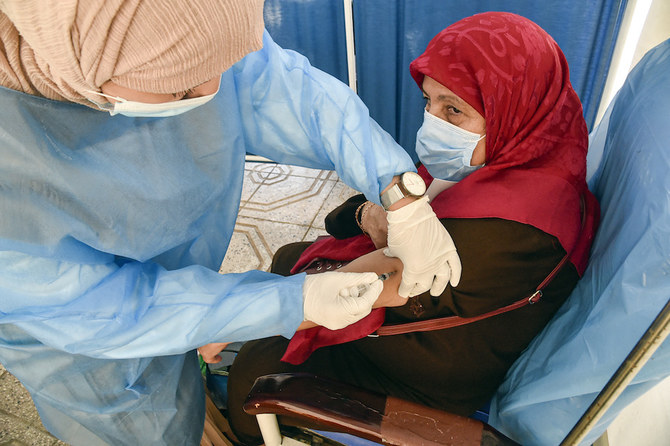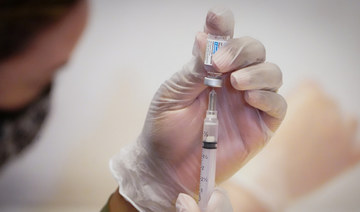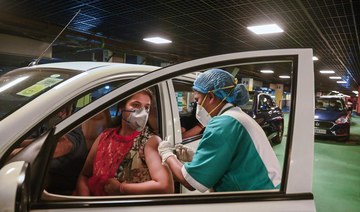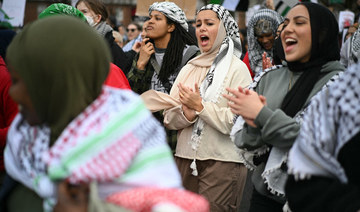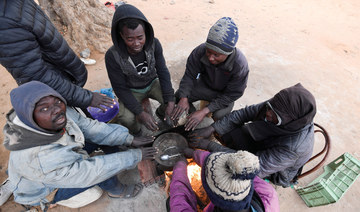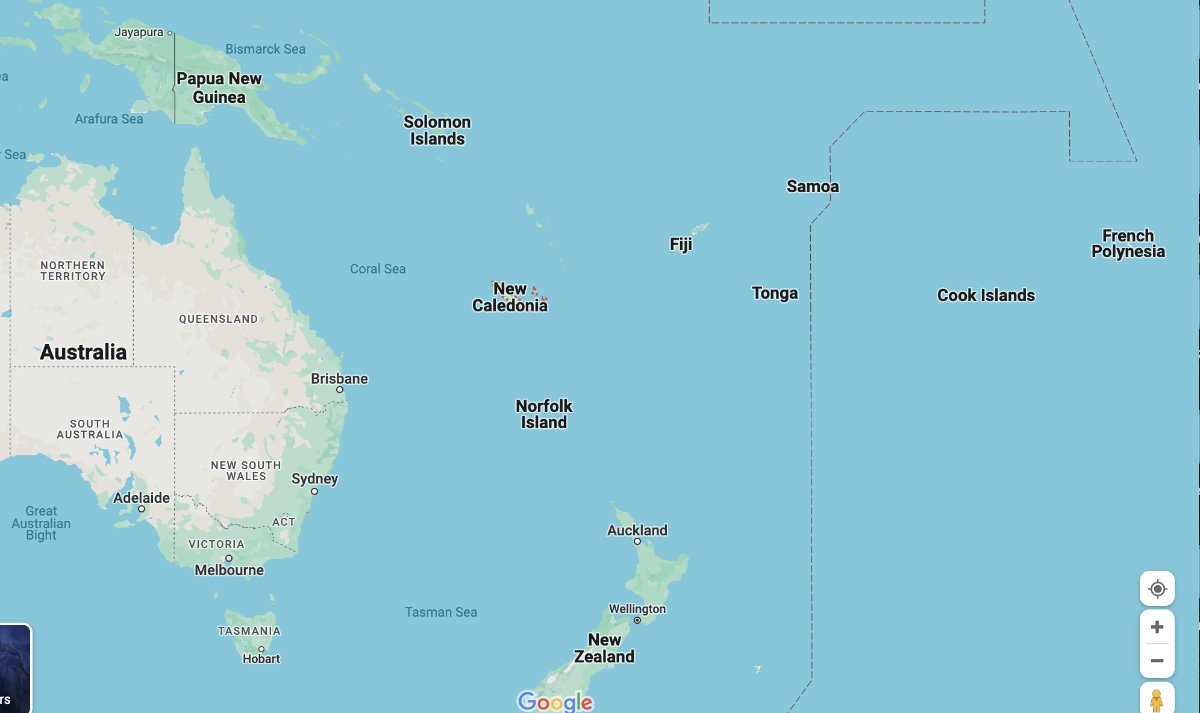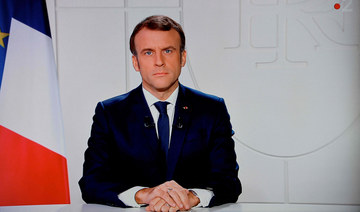BERNE: How vaccines can be fairly distributed to the global population is a question that has vexed world leaders and international agencies since the first shots offering protection against the coronavirus disease became available at the end of last year.
The issue was high on the agenda of the recent World Health Organization (WHO) general assembly, and the G7 heads of state are bound to further ponder the matter when they meet face to face in a Cornish resort in the UK this weekend.
Until a suitably large proportion of the world’s population is vaccinated against COVID-19, the pandemic cannot be considered over.
Tedros Adhanom Ghebreyesus, the WHO’s director general, recently urged countries to commit to vaccinating at least 10 percent of their populations by September and 30 percent by the end of the year.

Stepping up the global vaccination drive could benefit economies across the board. The International Monetary Fund recently predicted that a successful vaccination program, funded with $50 billion, could add as much as $9 trillion to the global economy by 2025.
It is with this in mind that world leaders view the provision of vaccines to the developing world as not just a humanitarian imperative but also an economic necessity.
There are also the practicalities of such a mammoth undertaking to be considered.
According to Our World in Data, a research tool compiled by analysts at the University of Oxford’s Global Change Data Lab, 63 percent of Israelis, 60 percent of Britons, and 52 percent of Americans had received at least one dose of a COVID-19 vaccine as of June 6.
By contrast, in the world’s emerging economies, just 23 percent of Brazilians and 13 percent of Indians have had their first jab, while the average throughout Africa was lower than 2 percent.

Until a suitably large proportion of the world’s population is vaccinated against COVID-19, the pandemic cannot be considered over. (AFP/File Photo)
Similarly, while most countries in the developed world have ordered enough doses to vaccinate their entire populations several times over, just 0.4 percent of shots have been administered in low-income countries, according to the WHO.
The question now is how to put right this shocking imbalance.
One option is COVAX, an initiative designed more than a year ago to address the issue of equitable vaccine distribution to low-income nations. It is led by Gavi, the Vaccine Alliance, a public-private partnership with the WHO.
World leaders have made numerous pledges to help developing countries inoculate their people. On May 21, Italy chaired a world health summit that culminated in the Rome Declaration, setting out the guiding principles for the fair distribution of vaccines.

German Chancellor Angela Merkel pledged $1.2 billion to the effort, while China has said it will give $3 billion over the next three years. France has offered 500 million euros ($608 million) to the G20’s Access to COVID-19 Tools (ACT) Accelerator and 30 million doses, while the US has promised to share its excess doses with poorer countries.
On June 2, Japan and Gavi hosted a joint virtual summit, which raised $2.4 billion in support of vaccination efforts in low-income countries. Belgium, Denmark, Japan, Sweden, and Spain have also earmarked 54 million of their excess doses for shipment to poorer nations.
THENUMBER
* 250 million - Additional doses needed to vaccinate 10% of the population of every country by September, 30% by year end.
Although well meaning, all of these efforts have fallen short. Gavi has so far shipped more than 77 million doses to 127 countries. Compare that with the 2 billion-plus doses the US and the EU had on order as of March – for a combined population of just under 800 million.
No wonder the modus by which these vaccines have been shared has come under close scrutiny.
India and South Africa have proposed a waiver on the patents for COVID-19 vaccines so they can be produced more affordably and where they are most needed.
US Trade Representative Katherine Tai said American President Joe Biden’s administration would support such a dialogue on the waiving of patent rights through the World Trade Organization (WTO). Since the US has long been a staunch defender of intellectual property rights, this about-face came as something of a surprise.

Director General of the World Health Organization (WHO) Tedros Adhanom Ghebreyesus. Vaccine sharing, strengthening the WHO and adopting a pandemic treaty were among proposals from world leaders on May 24, 2021 on how to halt the Covid-19 pandemic and prevent future health catastrophes. (AFP/File Photo)
Pharmaceutical firms, including those in Europe and Japan, are not fond of the idea, although the EU has expressed an interest, as has China. The proposal also has the backing of WTO Director General Ngozi Okonjo-Iweala, a former World Bank vice president, Nigerian finance minister, and outgoing chair of Gavi.
Despite its political appeal, the WTO route would not be quick or easy, as any resolution would require unanimous approval. Furthermore, any such resolution would go against the agreement on trade-related aspects of intellectual property rights.
This week the WTO will discuss an alternative EU proposal, which envisions a compulsory licensing process involving a (minimal) fee.
Patent waivers for vaccines throw up all sorts of questions including whether there can be such a thing as intellectual property for an international public good, or if the inventor of an international public good deserves compensation. The EU licensing proposal is a cause for similar concern in regard to intellectual property rights.
These are not just moral questions; they are a matter of economics, which could influence the willingness of the private sector to contribute to the development of solutions to global problems well beyond the scope of the current pandemic.
While world powers debate the finer points of capitalism, the search for a better vaccine distribution framework continues. Vaccine production has been ramped up considerably, with 250 million doses dispatched just last week.

Men wait to be vaccinated against COVID-19 in Dubai on February 8, 2021. The UAE one of the best vaccination rates per capita in the world, second only to Israel. (AFP/File Photo)
A Bloomberg report says that an additional 6 billion doses are expected to be distributed by the end of the year. Pfizer has assured poorer countries of 1 billion doses in 2022. Moderna and other vaccine manufacturers have made similar pledges.
This just goes to show that the pharmaceutical industry is aware of what is at stake for global public health as well as for their business models.
That said, the success of a global vaccination drive will depend on factors other than just intellectual-property rights, with the condition of local governance and infrastructure being just two of them.
There is also a geopolitical dimension. China and Russia may well support India and South Africa in their quest to get patents lifted on COVID-19 vaccines because Moscow and Beijing have been using their own vaccines to further their geopolitical clout, particularly in poorer countries, by exerting their grip over their domestic private sectors.
In the US, the Biden administration’s willingness to engage in the patent debate plays well with the left-wing of the Democratic party. However, major lobbying efforts are expected from the biotech and pharmaceutical industries to stave off such a waiver.
In free-market economies, incentives come in the form of compensation, which drives the behaviors of companies and investors alike. Firms that are starved of investment do not have the capital to fund research unless it is part of a national imperative. This is particularly pronounced in the defense industry.
The rapid development of COVID-19 vaccines in under a year was largely driven and funded by private companies and capital. A lot will depend on the outcome of the WTO discussion, as it may well determine the viability of the pharma industry as a private enterprise and shape the future of public-private partnerships.
---------------------
- Cornelia Meyer is a Ph.D.-level economist with 30 years of experience in investment banking and industry. She is chairperson and CEO of business consultancy Meyer Resources. Twitter: @MeyerResources



